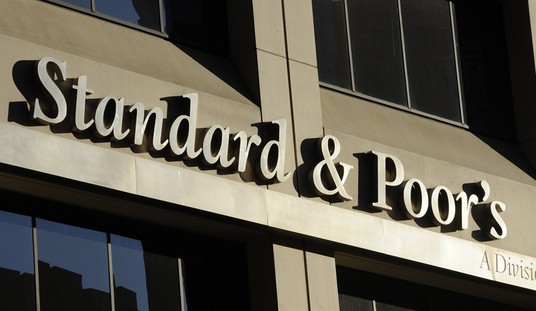Do we need to expedite vaccine distribution around the world? Absolutely. Did the latest variant of COVID-19 result from “hoarding” of vaccines by wealthy nations? That depends on the definition of “wealthy” and the precise origin of Omicron. Epidemiologists first identified the new variant in South Africa, which might play hob with the Associated Press’ rush to judgment on the “cause” of the variant:
The emergence of the new omicron variant and the world’s desperate and likely futile attempts to keep it at bay are reminders of what scientists have warned for months: The coronavirus will thrive as long as vast parts of the world lack vaccines.
The hoarding of limited COVID-19 shots by rich countries — creating virtual vaccine deserts in many poorer ones — doesn’t just mean risk for the parts of the world seeing shortages; it threatens the entire globe.
That’s because the more the disease spreads among unvaccinated populations, the more possibilities it has to mutate and potentially become more dangerous, prolonging the pandemic for everyone.
“The virus is a ruthless opportunist, and the inequity that has characterized the global response has now come home to roost,” said Dr. Richard Hatchett, CEO of CEPI, one of the groups behind the U.N.-backed COVAX shot-sharing initiative.
Except that South Africa wasn’t a “vaccine desert,” virtual or otherwise. A week ago, just prior to the emergence of Omicron, Reuters reported that South Africa had stopped accepting new shipments of vaccine doses thanks to a glut. The problem in that country was uptake, not provisions:
South Africa has asked Johnson & Johnson (JNJ.N) and Pfizer (PFE.N) to delay delivery of COVID-19 vaccines because it now has too much stock, health ministry officials said, as vaccine hesitancy slows an inoculation campaign.
About 35% of South Africans are fully vaccinated, higher than in most other African nations, but half the government’s year-end target. It has averaged 106,000 doses a day in the past 15 days in a nation of 60 million people.
Earlier this year the programme was slowed by insufficient doses. Now deliveries have been delayed due to oversupply, making the country an outlier in the continent where most are still starved of vaccines.
Nicholas Crisp, deputy director-general of the Health Department, told Reuters that South Africa had 16.8 million doses in stock and said deliveries had been deferred.
So much for the “vaccine desert,” as well as the class-warfare argument. Is South Africa a “wealthy” nation? Not particularly, but they’re hardly poor either. A 2020 ranking by total national wealth puts them 43rd, trailing Vietnam and even Bangladesh, but still firmly in the upper third of global rankings. Did Omicron generate in South Africa? That may never be determined; it certainly might have originated in a poorer neighboring country, but there’s no evidence to support that. In contrast, Omicron got identified in South Africa first, and that’s also where transmission of the variant appears to be the most intense.
At the very least, attributing Omicron to “vaccine deserts” is premature and unsupported by evidence. This looks suspiciously like narrative journalism — an attempt to tell a preferred story and jump to conclusions without regard to evidentiary support. If anything, one could wrap this around vaccine hesitancy rather than “hoarding” and perhaps get a little closer to the truth.
However, even that’s more correlative and conjecture than scientific fact. Viruses mutate over time anyway, but there’s no scientific threshold for viral mutation potential at certain levels of herd immunity. If Omicron emerged from a population that’s 35% immunized by vaccination, then it could just as easily have emerged here in the US from states where full immunization by vaccination is only moderately better. It could also emerge in places where vaccination rates are higher but recent transmissions intensified through a significant random mutation. There is presumably more likelihood of that happening in lower-immunization-level populations, which is why we want vaccines to be distributed as widely and quickly as possible. But that also requires a population willing to get immunized, which was the actual problem in South Africa, not vaccine shortages.
Also, let’s remember that mutation isn’t impossible in higher-vaccinated populations with more cooperation in vaccination, either. The spike in cases in our cold-weather states could also generate a new variant at some point. Hopefully it won’t, but it could.
One last point: thus far we have focused on vaccine-related acquired immunity. We still aren’t measuring infection-acquired immunity, probably because we still aren’t doing wide population testing for any reason at the moment. That would factor into variant potentials too, assuming that — and this is still an assumption — that immunity blocks transmission and mutations entirely. Do we know this to be the case? It certainly doesn’t seem that way, and that might make “vaccine deserts” even less relevant to mutations. The fact that the vaccinated can still be infected and perhaps even contagious argues against the idea that mutations only happen in “vaccine deserts.”
That doesn’t mean we should discount the issue of vaccine deserts and mutation potential, but the real priority for wide distribution of vaccines is preventing as many critical cases of acute COVID infections and saving lives. If we’re prioritizing a defense against mutations, it becomes a risk-reward calculation. Until we have vaccine doses in the billions, we are forced to deal with a shortage structure, which requires rationing. Rationing will always have to take national interests into consideration as well as international and humanitarian interests. The countries that produce the vaccines will always want to protect their own citizens first and then take care of others next, especially representative republics with real accountability to voters. They will prioritize saving lives now over potential mutations to come, and for good reason.
The best strategy would be to distribute vaccine production as widely as possible. That lands the output where it’s needed, and where it won’t require as much competition in a shortage environment. But even then, just because a country has the vaccines doesn’t mean they’ll go into arms … as South Africa and the United States has discovered. That’s a “trust desert” issue, not a “vaccine desert” issue.








Join the conversation as a VIP Member